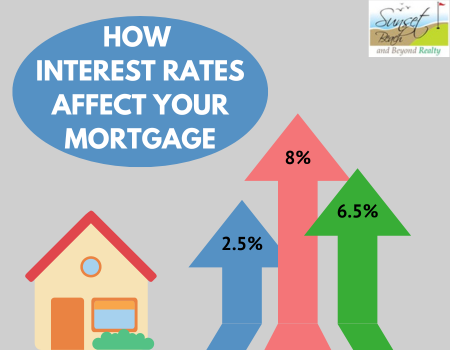When it comes to buying a home understanding the ins and outs of mortgage interest rates can significantly affect your home buying process as well as your budget for purchasing a home. Interest rates can determine not only your monthly mortgage payments but also the total amount you end up paying over the life of the loan. It’s a common thought among buyers that you should wait to buy until interest rates drop, and while this isn’t always a bad idea, understanding the “why” behind the cost of interest rates it ideal in helping you purchase a home.
 How Interest Rates Affect Your Mortgage
How Interest Rates Affect Your Mortgage
Your interest is calculated as a percentage of the principal, which is the amount you initially borrow/finance to purchase your home. Essentially, the interest rate is the cost of borrowing the money from the bank. The rule of thumb is pretty straightforward: the lower the interest rate, the less you will pay in interest over the duration of your mortgage, making the overall borrowing cost significantly cheaper.
For those locked into a fixed-rate mortgage, fluctuations in interest rates have little to no immediate effect on monthly payments. This stability allows for consistent budgeting without the worry of changing rates. However, if you have an Adjustable Rate Mortgage (ARM) or a Home Equity Line of Credit (HELOC), your interest rates—and consequently, your payments—can increase substantially when rates rise.
The Real Cost of Waiting for Lower Rates
It’s tempting to hold off on buying a home with the hope that interest rates will fall. However, waiting for a lower rate is not always the best decision. For instance, consider the impact of a change from a 3% mortgage rate to a 7% rate. An increase like this can add approximately $1,000 to a monthly mortgage payment on a median-priced single-family home. This not only affects affordability but can also push millions of potential buyers out of the market. So while you’re waiting for rates to drop, you consequently are risking the possibility of rates rising, thus losing your ability to purchase a home or being priced out.
Interest rates are influenced by a variety of complex factors including economic conditions, inflation, and monetary policy decisions by the Federal Reserve. Predicting these changes can be highly uncertain and are truly just a “best guess” scenario. Waiting for a drop might result in missing out on favorable purchasing opportunities or buying a home when prices are higher, ultimately negating the benefits of a lower rate.
When to Buy?
The decision to buy a home shouldn’t hinge solely on interest rates. Other factors such as market conditions, personal financial stability, and housing needs are equally as important. If the market conditions are right, delaying a purchase in anticipation of lower rates can be a gamble with no guaranteed payoff. Instead, consider the following strategies:
- Lock in a Fixed Rate: If you find a reasonable fixed-rate mortgage, securing it can protect you against future rate increases and provide payment stability.
- Refinance Opportunities: Even if you buy when rates are higher, refinancing when rates drop can reduce your payments and total borrowing cost. This option requires keeping a close eye on market trends and being ready to act when conditions are favorable.
- Financial Readiness: More than the mortgage rate, your readiness to take on a long-term financial commitment should guide your decision. Ensure you have adequate savings, stable income, and a good credit score to secure the best rates available.
While lower interest rates can mean lower monthly payments and less paid in interest over time, they are just one piece of the homeownership puzzle. The best time to buy a home is when you are financially prepared to do so, and when the market conditions align with your personal and financial circumstances. Instead of trying to time the market based on interest rates alone, focus on your overall readiness to commit to a mortgage, and work with professionals who can help you navigate the complexities of home buying.
